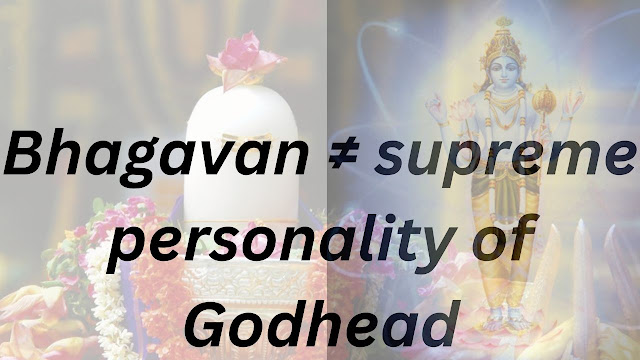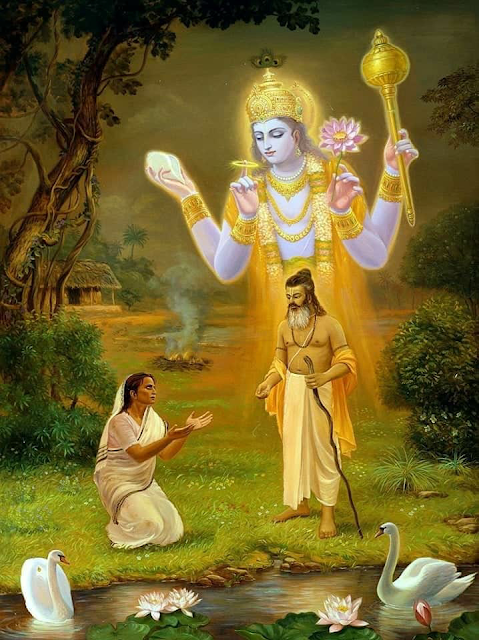विष्णु पुराण 6.5.47:
Image: It is easy to use fancy English vocab to give self-styled commentaries to profound sanskrit terms.
Viṣṇu Purāṇa 6.5.47:
ऐश्वर्यस्य समग्रस्य वीर्यस्य यशसः श्रियः
ज्ञानवैराग्ययोश् चैव षण्णां भग इतीरणा
aiśvaryasya samagrasya vīryasya yaśasaḥ śriyaḥ
jñānavairāgyayoś caiva ṣaṇṇāṃ bhaga itīraṇā
The 6 qualities or guNas are
(1) complete sovereignty over everything
(2) complete power
(3) complete glory
(4) complete wealth
(5) complete knowledge
(6) complete detachment
These 6 qualities constitute Bhaga. The absolute reality ( Brahman ) is therefore referred to as Bhagavan ( One who possesses Bhaga ).
In the Vedic culture, the idea of a single personality of God who stands as the only true one cannot function because the term Bhagavan is coined to many aspects and deities across the culture.
Image: It is easy to use fancy English vocab to give self-styled commentaries to profound sanskrit terms.
That is why we even have the feminine term of the same word as 'Bhagavati' which is used for Devi.
Let us look at some examples:
(1) Lord Krishna is referred to as Bhagavan in the smritis.
Quoting Shrimad Bhagavatam Purana ( 1.3.28 ), authored by Veda Vyasa.
एते चांशकला: पुंस: कृष्णस्तु भगवान् स्वयम् ।
ete cāṃśakalā: puṃsa: kṛṣṇastu bhagavān svayam ।
Here Lord Krishna is referred to as Bhagavan - one who possesses Bhaga. But is He the Only One who possesses Bhaga?
(2) Rudra is also referred to as Bhagavan in Yajur Veda. The Vedas in fact always stand as the highest authority of Hinduism.
Rudra Prashna, Yajur Veda ( TS 4.5 )
याश्च ते हस्त इषवह् परा ता भगवो वप
yāśca te hasta iṣavah parā tā bhagavo vapa
In this verse, Lord Rudra is referred to as Bhagavan ( bhagavo comes from bhaga+ vaH which means One who possesses Bhaga ).
(3) Veda Vyasa Himself uses the word 'Bhagavati' to denote Devi.
जय भगवति देवि नमो वरदे जय पापविनाशिनि बहुफलदे ।
jaya bhagavati devi namo varade jaya pāpavināśini bahuphalade ।
This verse of Bhagavati Stotram was composed by Veda Vyasa Himself, who also authored Shrimad Bhagavatam.
Bhagya Sukta of Vedas
Video: My student Kum. Shravanthi and I reciting the Bhagya Suktam. Meanings included
The Bhagya Sukta comes in several parts of the Vedas, notably in the Rig Veda, Taittiriya Brahmana of Yajur Veda and Atharva Veda.
'Bhaga' itself is manifest as a deity. 'Bhagya' is the fortune which is bestowed by Bhagavan. This is how we get ' Bhagya Devata' as a deity.
Taittiriiya Brahmana, Krishna Yajur Veda 2-8-9-6
प्रातरग्निं प्रातरिन्द्रग्ं हवामहे प्रातर्मित्रा वरुणा प्रातरश्विना। प्रातर्भग्ं पूषणं ब्रह्मणस्पतिं प्रातस्सोममुत रूद्रग्ं हुवेम |
prātaragniṃ prātarindragṃ havāmahe prātarmitrā varuṇā prātaraśvinā। prātarbhagṃ pūṣaṇaṃ brahmaṇaspatiṃ prātassomamuta rūdragṃ huvema |
This verse guides us to invoke several deities at dawn. The deities are agni, indra, mitra, varuNa, ashvins, bhagam, puusHa, brahmaNaspati, soma and rudra
We have another verse from this Sukta:
भग एव भगवागूं अस्तु देवास्तेन वयं भगवन्तस्स्याम
bhaga eva bhagavāgṃ astu devāstena vayaṃ bhagavantassyāma ।
bhagaHa = bhaga
eva = indeed
bhaga-vaan = One who possesses bhaga
astu = be
devaaHa = deva ( one who shines )
tena = thus
vayam = all of us
syaama = to materialise
This verse translates to ' may all the deities become Bhagavan. May we all become Bhagavan! '
This indicates the state of enlightenment or sayujya where we attain complete oneness with the absolute reality, thus becoming 'that'.
Also Read:






Great article. Explained very well and learning a lot from you.
ReplyDelete